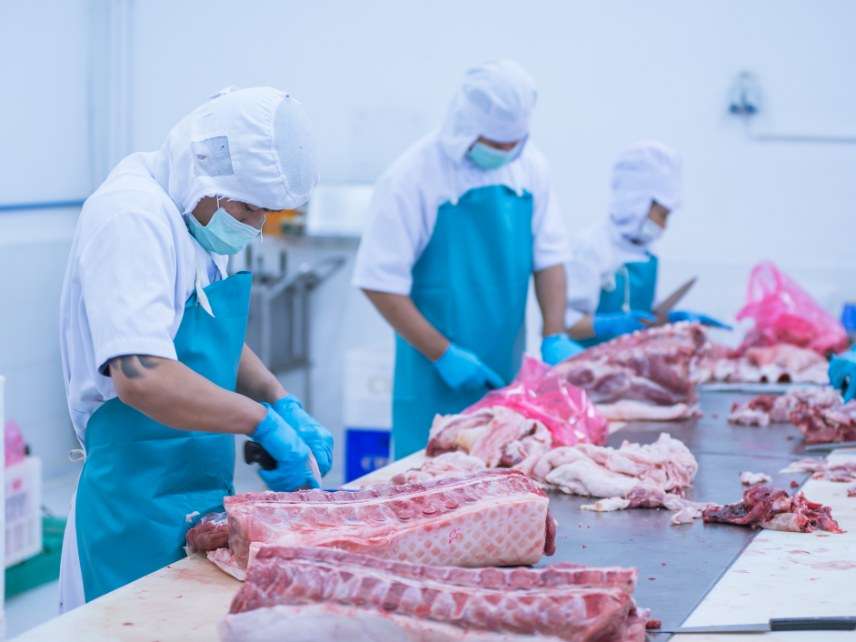Maine Food Sovereignty Bends but Doesn't Break After USDA Threats
Law amended to make sure meat processors comply with federal regulations.

This past June, Maine legislators passed a law, An Act to Recognize Local Control Regarding Food Systems, which allows cities and towns in the state to adopt laws permitting farmers and other food producers within their borders to engage in a host of direct-to-consumer food sales. The law, intended to bolster local food economies in the state, allows Maine municipalities to "regulate by ordinance local food systems," and requires the state, in turn, to "recognize such ordinances."
While the act was intended to protect people like the "one-cow farmer who feeds the people in his community the food they want to eat," its protections had limits.
"The law does not cover sales outside a given city or town that has a food sovereignty ordinance in place," I wrote in a column shortly after the law passed. "Neither does the law pre-empt federal law."
And it's that latter area that got Maine into hot water with the federal government, before the law ever took effect.
"Maine's Department of Agriculture is concerned that the law would keep it from inspecting any meat slaughtered and processed in a town that is food sovereign, negating an agreement it has with the USDA to meet federal standards," the Portland Press Herald reported last week.
Indeed, threats made by the U.S. Department of Agriculture (USDA) against the state forced Maine lawmakers this week to amend its food-sovereignty law.
In a July 6 letter from USDA to Maine's agriculture department, the federal agency threatened to pull its approval of slaughterhouses in the state, which could have temporarily shuttered five facilities in Maine and left Maine livestock farmers scrambling to find available out-of-state slaughter options.
The letter, written by the USDA's Alfred Almanza, says the agency is "concerned that the Food Sovereignty Act, if implemented as currently written, would contravene Federal food safety laws and regulations."
The USDA also threatened Maine—one of 27 states to run its own meat inspection system—with federalization of its slaughter regime.
At an emergency legislative session this week, Maine lawmakers amended the law to require cities and towns that adopt new ordinances under the Food Sovereignty Act to "comply with state and federal laws when developing local ordinances for meat and poultry production and sales."
That followed a committee vote to amend the law last week.
While the Press Herald contends "[t]he cause of the problem is [Maine's] food sovereignty bill," that's not really the case. The causes (plural) of the problem reside in Washington. These causes are the USDA, Congress, and the Supreme Court.
Maine's food sovereignty movement arose earlier this decade as a response to a state law requiring even the smallest poultry farmers to invest tens of thousands of dollars on needless processing costs.
"Show me a farmer who spends $30,000 to sell $1,000 worth of food and I'll show you a farmer who's out of business," I write in my recent book, Biting the Hands that Feed Us: How Fewer, Smarter Laws Would Make Our Food System More Sustainable. "Food sovereignty ordinances sought to address the absurdities of laws like these."
The idea that local farmers might butcher and process their own meat for commercial sale—or use a local abattoir to do the same—rubbed the USDA all wrong. That's because of a 1967 federal law that granted the USDA ultimate oversight of all beef, poultry, and pork processing for commercial sale. While the USDA does carve out a few exceptions—for farmers who don't intend to sell their meat to a grocer or restaurant or other commercial outlet and instead sell to, for example, bulk meat to an individual buyer—few can use a custom, non-USDA slaughterhouse.
If it sounds bizarre to you that the USDA will fight for its power to regulate the sale of a single steak in some rural Maine town, that's not the half of it. The fact a law even exists that makes the USDA even believe the agency has such power is one part of the real problem.
It's not just Congress's fault, though. According to the Supreme Court, almost everything—including baking a loaf of bread at home for your family—is interstate commerce.
I may not like the way the federal government regulates interstate commerce in meats and meat products. Put another way, I don't like it. But that doesn't mean the federal government doesn't have plenary power to regulate these sales if it so chooses. It does. The Constitution, including particularly the Commerce Clause, speak clearly on this.
But intrastate commerce is not interstate commerce. Maine's Food Sovereignty law clearly and only pertains to the former.
"The new law will face tests, no doubt, particularly in cases where local food sovereignty ordinances might bump up against federal law," I wrote of Maine's Food Sovereignty Act in my July column. "Maine farmers, consumers, and lawmakers will have to be vigilant about the potential for [incursions] from the USDA and FDA."
Those incursions happened. Rather than repeal the law, though, as the USDA no doubt would have preferred, Maine lawmakers amended it to allow the law—and farmers and local food communities in the state—the opportunity to thrive. The Food Sovereignty Act faced its first test, and it survived.


Show Comments (67)